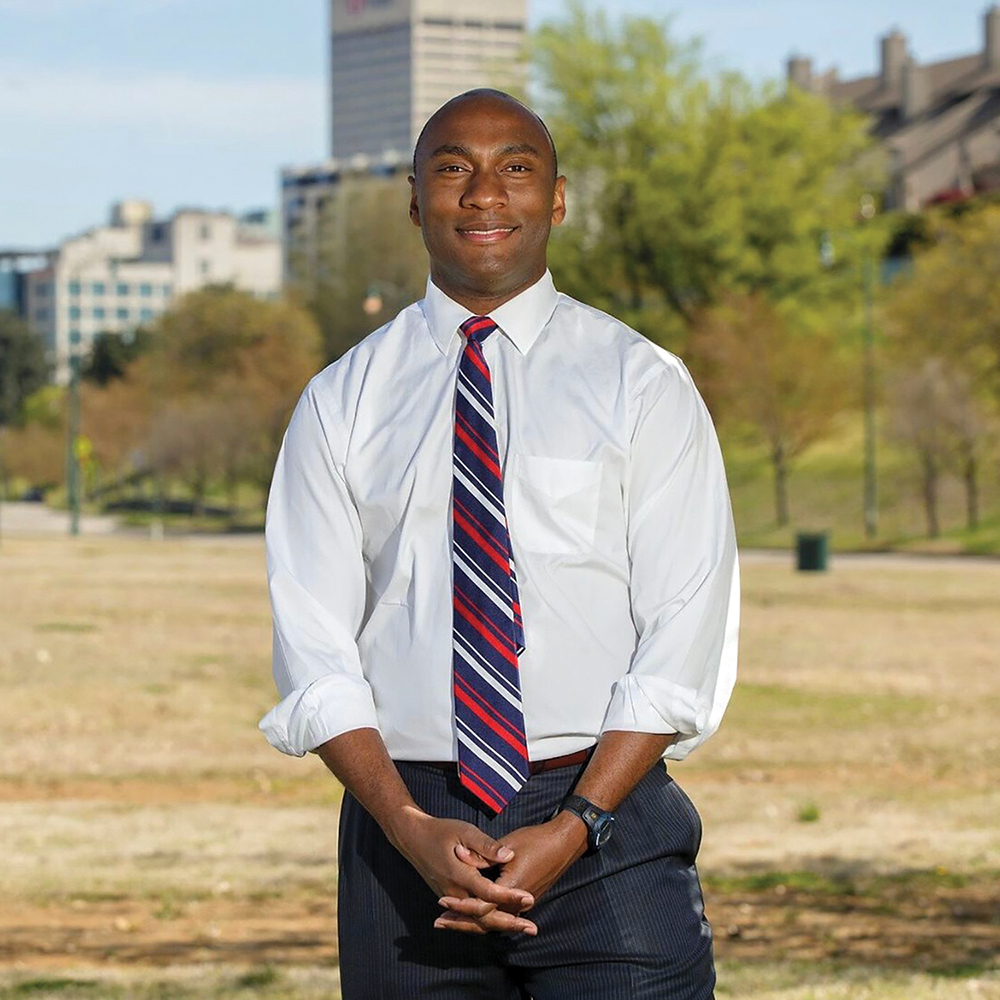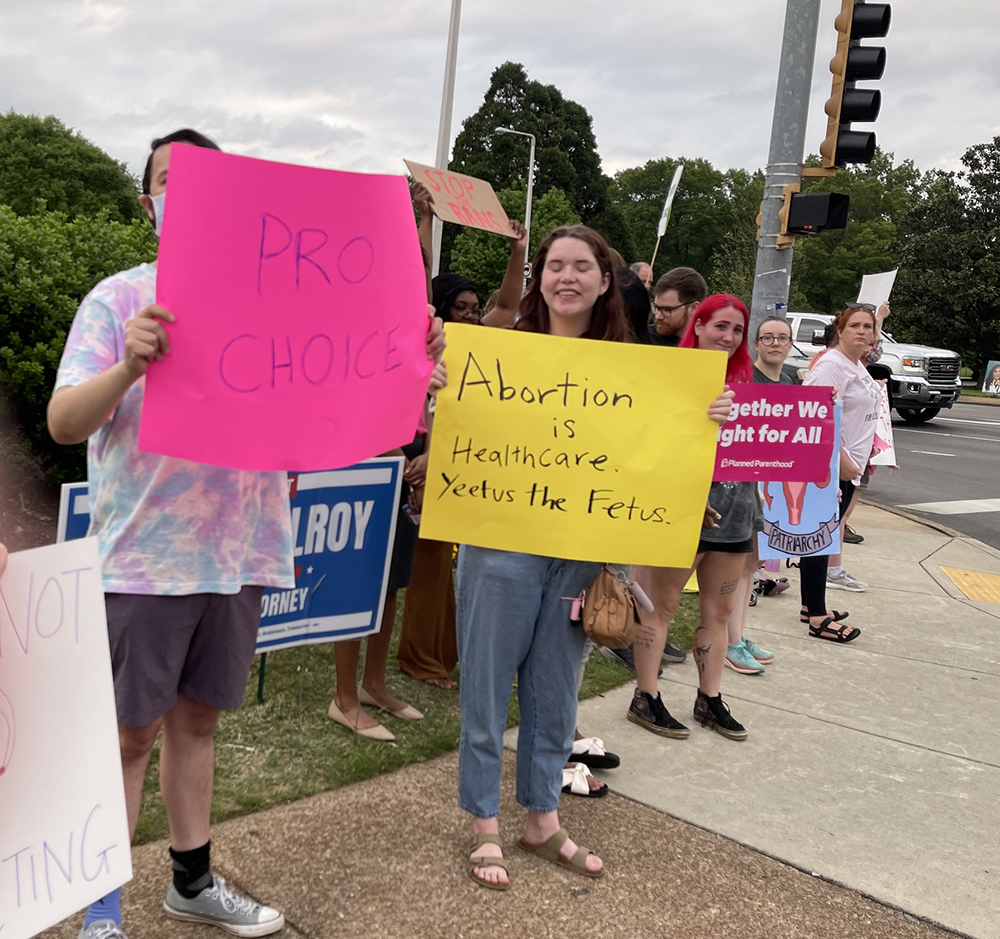The blue wave of 2018 was not unique to Shelby County; it crested virtually everywhere in the nation, but in that year’s Shelby County election, it became a tsunami, flooding out what had been an extended period of Republican dominance that began with the establishment of partisan elections in 1992. The fact that the GOP chose not even to compete this year for the position of sheriff was a concession to the party’s obviously reduced strength in a majority-Black, Democratic-leaning local population.
Statewide, Shelby County’s preeminence in Democratic affairs has historically been shared with Davidson County, site of the state capital of Nashville. As Memphis Congressman Steve Cohen pointed out at a recent Democratic rally, however, the party’s position in the capital has been somewhat undermined by the governing GOP’s ruthless gerrymandering in the 2022 session of the General Assembly. District lines were redrawn so as to reduce Nashville’s Democratic representation in the legislature and to virtually eliminate its ability to elect a Democratic congressman.
As was noted by Cohen, who is likely to end up being the sole surviving Democratic member of the U.S. House of Representatives from Tennessee, this development enlarges the status of the Memphis area as an anchor of the state’s fast-disappearing two-party system.
State and Federal
It is no coincidence that the three candidates for the Democratic nomination for governor hail from the state’s two major metropolises. Jason Martin, who began running more than a year ago after charging incumbent GOP Governor Bill Lee with negligence during the Covid-19 epidemic, is from Nashville, while Carnita Atwater, a public health administrator, and JB Smiley, a city councilman, are both Memphians. The three Democrats agree on most issues, especially in their condemnation of Lee’s controversial school-voucher program, which targets only Memphis and Nashville.
Lee is unopposed in his own primary and — in spite of, or because of, his unrelentingly arch-conservative position on all issues save that of criminal justice reform — netted a favorability rating of 56 percent in the latest Vanderbilt University poll.
In little more than a decade’s time, the political complexion of Tennessee at large has gone from traditionally Democratic to defiantly Republican, and Lee will be heavily favored against whichever Democrat wins their primary.
Shelby County is served by two congressional districts — the 8th, which consists of a broad swath of rural West Tennessee, along with a strategic salient in affluent East Memphis, and the 9th, which, post-gerrymandering, extends from most of Memphis through Millington to a portion of Tipton County. Republican 8th District incumbent David Kustoff of Germantown should win easily in the GOP primary against challengers Danny Ray Bridger Jr. of Milan, Gary Dean Clouse of Somerville, and Bob Hendry of Collierville. Tim McDonald of Jackson and Lynette Williams of Collierville vie in the Democratic primary for the right to oppose Kustoff in November.
The aforementioned Cohen, a national as well as a local figure, who normally has only pro forma opposition, envisions a somewhat stouter test than usual. To be sure, his primary opponent, M. LaTroy Alexandria-Williams, is but a perennial candidate, as — on the Republican side — are Charlotte Bergmann and the madcap pretender Leo AwGoWhat. But a third Republican, the odds-on favorite to win his primary, is Brown Dudley, a Memphis entrepreneur who has GOP establishment support and enough cash on hand to give Cohen at least a theoretical run for his money in November.
On the Democratic side, there are five contested races — one of the state Senate and four for the state House.
In Senate District 33, former State Rep. London Lamar, recently appointed to the seat by the County Commission, is heavily favored over two primary opponents — Marion LaTroy Alexandria-Williams Jr. and Rhonnie Brewer. Republican Frederick D. Tappan will be her Republican opponent in November.
In House District 84, longtime Democratic incumbent Joe Towns Jr. has a primary opponent, Brandon Price, but should win another term. Likewise, Democratic incumbent Jesse Chism is heavily favored over primary opponent Phyllis Parks in District 85.
In House District 86, Barbara Cooper, still going strong in her 90s, has the most formidable opponent in quite a while in Will Richardson, who basically talks up his presumably fresher legs. Democrat Torrey Harris, a first-termer in a reconfigured district, is favored over challenger Barbara Farmer-Tolbert in District 91.
Meanwhile, Democrats Toniko Harris and Houston Wolf vie for the right to oppose District 97 GOP incumbent John Gillespie in November.
On the Republican side, the only contested legislative race is the House District 99 primary between incumbent Tom Leatherwood and challenger Lee Mills. This is a grudge match of sorts, the third contest for the seat, in one way or another, between Leatherwood and Mills, who was notified early this year by state Elections Coordinator Mark Goins that, according to census maps, his house was in the outlying portion of a subdivision split between Shelby and Fayette counties. Chancellor Jim Kyle ruled that Mills and his wife, County Commissioner Amber Mills, could stay on the ballot in Shelby County because they paid their property taxes there.

County General Election
Shelby County Mayor: Strictly speaking, the major countywide seat up for grabs is that for Shelby County mayor. But the race between Democratic incumbent Lee Harris and Republican challenger Worth Morgan has somehow managed to stay on the back burner, public attention-wise. This is despite the fact that both candidates have had access to, and employed, ample budgets. (During any election season, a drive down Walnut Grove will tell you who the big spenders are, and Morgan’s yard signs are much in evidence there this year.)

City Councilman Morgan has inveighed against what he says has been Harris’ failure or negligence on matters of public safety, public accessibility, and public affairs in general. “We Deserve Better,” he says, citing, among other things, the initial snafus in the county’s distribution of Covid vaccines, but his advertising has focused on a dubious claim that the mayor has somehow “defunded the police.” Upon examination, the charge — dependent on a highly creative reading of county budget numbers — founders, and Sheriff Floyd Bonner, whose department would seem to be the county equivalent of “the police,” has made no such contention. With regard to truth in advertising, the public deserves better.
For his part, Harris has emphasized a series of governmental initiatives he has pursued, in areas ranging from criminal justice, most notably his Second Chance program for youthful offenders, to gun safety to storm damage to mental health and more, including even the creation of a citizen pipeline on reactions to the war in Ukraine.
On the strength of relative party strengths alone, Harris would seem to have the advantage. There are those who see Morgan’s race as a matter of introducing himself to the public for such future-tense purposes as may occur.

District Attorney General: Unmistakably, this is the contest which is regarded as the marquee race on the ballot and the one on which both major parties have dug in their heels. Unlike the four-year terms mandated for other countywide offices discussed in this section, the term of a DA runs for a full eight years. Though incumbent DA Amy Weirich carries the Republican Party label (and its residual hopes for the party’s relevance in county government), she is not especially partisan in demeanor and, in fact, has been critical of pro-gun legislation by the General Assembly’s GOP super-majority.

But she is definitely to the right on matters of criminal justice, on the “Law and Order” side of the equation, or, as she puts it, on the side of the victims of crime. Her Democratic opponent, University of Memphis law professor and former County Commissioner Steve Mulroy, is an exponent of various criminal-justice reforms and contends that Weirich’s positions are rigid and overly harsh, counterproductively so. Between the two positions, and inclusive of them, is a whole universe of useful options to be considered, but the contest has so far smacked more of the legal courtroom’s adversary process than it has of Socratic dialogue.
Mulroy cites various chastisements conferred on Weirich by judicial tribunals as indication of an overzealous prosecutorial zeal. He pronounces her the “worst” DA in Tennessee both in that regard and by virtue of a steady upsurge in violent crime locally during her tenure. She alleges a general laxity in Mulroy’s concern for victims — notably in a highly contentious TV commercial that misleadingly suggests he is a “Defund the Police” advocate motivated by a desire to turn criminals loose.
The two have real differences. Mulroy is for bail reform and post-conviction reviews; Weirich is for “truth-in-sentencing.” On the matter of enforcing the state’s new anti-abortion law, which prescribes criminal penalties, both are circumspect, though Mulroy states directly that prosecuting offenders of the statute would be a “low priority” for him and Weirich insists that the issue is at this point hypothetical. In the event, it is doubtful that either would be prone to pursue such a prosecution. (The law allows for the intervention of a special prosecutor appointed by the state.)
Mulroy has made an issue of what he says is serious racial disparity in the current DA’s office, especially in the prosecutorial ranks, while Weirich maintains she is actively recruiting to improve the balance.
None of the other countywide races have quite the impact or ideological import of the two discussed above, though the principals in them and their respective parties take the potential outcome quite seriously.
Assessor: Melvin Burgess, the Democratic incumbent, has been aggressive both in executing his duties and in pursuing his campaign — enough so to be heavily favored over Republican nominee Steve Cross, who is a veteran of several county offices, including prior service in the Assessor’s Office.
County Trustee: Incumbent Democrat Regina Morrison Newman has accumulated 10 years of service in a partial appointed term and a full elected one. She also has served as president of the West Tennessee Trustees Association, collected some $20 million in back taxes, and initiated several customer-friendly new services as the county’s de facto tax collector. Her Republican opponent is Steve Basar, a former county commissioner who claims endorsements from all of Shelby County’s suburban mayors. Both candidates have worked hard at fundraising; Newman has the advantage of incumbency and whatever blue edge remains.

Sheriff: As indicated, incumbent Sheriff Floyd Bonner, a Democrat, has no Republican opponent but is opposed by two Independent candidates, Keisha Scott and Donald Taylor, both sheriff’s deputies. Bonner should win big.

Circuit Court Clerk: Democrat Jamita Swearengen, who has served recently as City Council chair, is opposed by Republican nominee Soheila Kail, a veteran of county service.
Criminal Court Clerk: Incumbent Democrat Heidi Kuhn has campaigned hard and can boast more than her share of awards during her term of service; she is opposed by Republican Paul Houston, a veteran of service with the Shelby County Correctional Center.
Probate Court Clerk: Democrat Eddie Jones, coming off eight years on the County Commission, during which he served as chair for a year, is opposed by Republican Dewayne Jackson.
County Clerk: Democrat Wanda Halbert handily won her party’s primary in May and can probably turn the trick again, despite a delay in getting out new state automobile plates. She is opposed by Republican Jeff Jacobs and Independent Harold Smith.
Register of Deeds: Democrat Willie Brooks, term-limited on the Shelby County Commission, leaves that body as its chair and is favored over Republican Bryan Edmiston and Independent George “Dempsey” Summers, a frequent candidate.

Juvenile Court Judge: Strictly speaking, this position sorts out with the judicial races indicated below. Like them, it carries an eight-year term and is elected on a nonpartisan basis. There are four candidates — William “Ray” Glasgow, Dan Michael, Dee Shawn Peoples, and Tarik B. Sugarmon — but almost all the attention has been focused on Michael and Sugarmon, who dueled for the judgeship eight years ago, with current incumbent Michael coming out ahead.
Two dormant matters have figured in the contest. Sugarmon wants to revive a proposal to create a second juvenile judgeship, while Michael, who opposes the idea, notes that he presides over 12 magistrate referees and says that any such expansion should be multifold. At issue, too, is whether the U.S. Department of Justice should revive a suspended process and return to monitor Juvenile Court for alleged racial inequities. Sugarmon says yes; Michael was one of the county officials who, on a claim of sufficient improvements, successfully petitioned for a halt in the monitoring process.
Judicial Races
Inflating the ballot to more than usual proportions in this election is the presence on it of all of the county’s elective judgeships, each of them carrying an eight-year term. The sitting judges and candidates vying for these positions on the bench are enjoined from political rhetoric per se. They may not proclaim their positions on issues likely to come before them, and, aside from affirming their own presumably superior credentials, they are not to attack or otherwise indict their opponents on the ballot.
Given the existence of such strictures and the sheer number of judicial positions to be chosen, it would be folly to expect the majority of lay voters to be properly prepared to make fully informed judgments on those who would judge them. Those members of the electorate best able to do so are members of the legal profession who encounter these candidates on a daily, familiar basis.
Accordingly, here, as a guide to voters at large, are the results of the Memphis Bar Association Judicial Qualification Poll for 2022. Only contested and retention races were polled, and 1,199 active Shelby County attorneys participated in the survey and expressed their preferences. Here they are, with “No Opinion” being an alternative choice in each race.

Circuit Court, Division II: Carlos Bibbs, 484; No Opinion, 308; Carol Chumney, 234; Kenneth Margolis, 173.
Circuit Court, Division VI: Stuart Breakstone, 605; Cedric Wooten, 310; No Opinion, 284.
Circuit Court, Division VII: Mary Wagner, 898; No opinion, 172; Paul Robinson Jr., 129.
Circuit Court, Division VIII: Robert Weiss, 779; Damita Dandridge, 190; No Opinion, 171; Larry Parrish, 59.
Chancellor, Part I: Gadson William Perry, 798; No Opinion, 215; Melanie Taylor Jefferson, 186.
Chancellor, Part III: JoeDae “Joe” Jenkins, 867; No Opinion, 259; Richard Parks, 73.
Probate Court Judge, Division II: Karen Webster, 465; No Opinion, 368; Joe Townsend, 366.
Criminal Court Judge, Division I: Paula Skahan, 868; No Opinion, 265, Michael Floyd, 66.
Criminal Court Judge, Division II: No Opinion, 417; Joe Ozment, 284; Jennifer Fitzgerald, 190; Gregory Carman,137; Samuel D. Winnig, 105; Amy G. Mayne, 66.
Criminal Court Judge, Division III: No Opinion, 465; Michael R. McCusker, 461; James Jones, 273.
Criminal Court Judge, Division V: Christopher J. Lareau, 513; No Opinion, 422; Carlyn Addison, 264.
Criminal Court Judge, Division VI: No Opinion, 375; David L. Pool, 366; Reginald Henderson, 270; Ross Sampson, 188.
Criminal Court Judge, Division VII: Lee V. Coffee, 741; No Opinion, 327; Kenya Brooks, 131.
Criminal Court Judge, Division VIII: Chris Craft, 841; No Opinion, 193; Sanjeev Memula, 165.
Criminal Court Judge, Division IX: Mark Ward, 888, No Opinion, 217; A. Melissa Boyd, 94.
General Sessions Civil Court Judge Division 1: Lynn Cobb, 688; No Opinion, 238; Lawrence A. Pivnick, 183; Victoria Gillard, 90.
General Sessions Civil Court Judge, Division 3: Danielle Mitchell Sims, 373; No Opinion, 354; Lincoln Hodges, 232; William “Bill” Larsha Jr., 138; Lisa N. Stanley, 102.
General Sessions Civil Court Judge, Division 4: Deborah Means Henderson, 783; No Opinion, 316; Eran E. Julian, 100.
General Sessions Civil Court Judge, Division 5: Betty Thomas Moore, 736; No Opinion, 300; Varonica R. Cooper, 163.
General Sessions Civil Court Judge, Division 6: Lonnie Thompson, 750; No Opinion, 309; Kim Gilmore Sims, 140.
General Sessions Criminal Court Judge, Division 7: Bill Anderson, 453; No Opinion, 334; Handel R. Durham Jr., 302.
